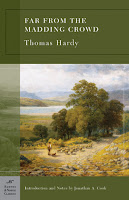
Classics Review: Far From the Madding Crowd is written in a convoluted 19th Century style in which the subject of a sentence may prove elusive at times. I had to be less sleepy than I sometimes am when I read, and a cup of tea or coffee might be a valuable assistant. An annotated edition will help. But once I became used to the style I was happily deep within the story and the very human, faceted characters. None are simple. Among the geometric love story there's the obsessive Boldwood, the predatory Troy, the steadfast and aptly named Gabriel Oak, the dangerous beauty Bathsheba Everdene, the center of the storm. They can seem like archetypes, at times even stereotypes, perhaps Biblical or mythological characters, but always with some human element that reminds the reader of someone from life. Only Oak seems a little too good to be true, much like Boxer from Animal Farm (though he comes to a better end). Hardy uses humor and sarcasm well and subtly in Far From the Madding Crowd, especially in his chorus of rural characters, a sort of rustic mechanicals. "His fist [was] rather smaller in size than a common loaf," "Bathsheba did not look quite so alarmed as if a cannon had been discharged by her ear." But he can also employ pathos as with the story of the inimitably named Fanny Robin, who deserves her own book. Hardy himself seems wise and all knowing, from how to save a sheep, fight a fire, harvest wheat, make music, or reference all of the Bible, poetry, art, and literature. "The rarest offerings of the purest loves are but a self-indulgence, and no kindness at all." Far From the Madding Crowd was Hardy's first Wessex novel and a wonderful introduction to his work. [5★]
No comments:
Post a Comment